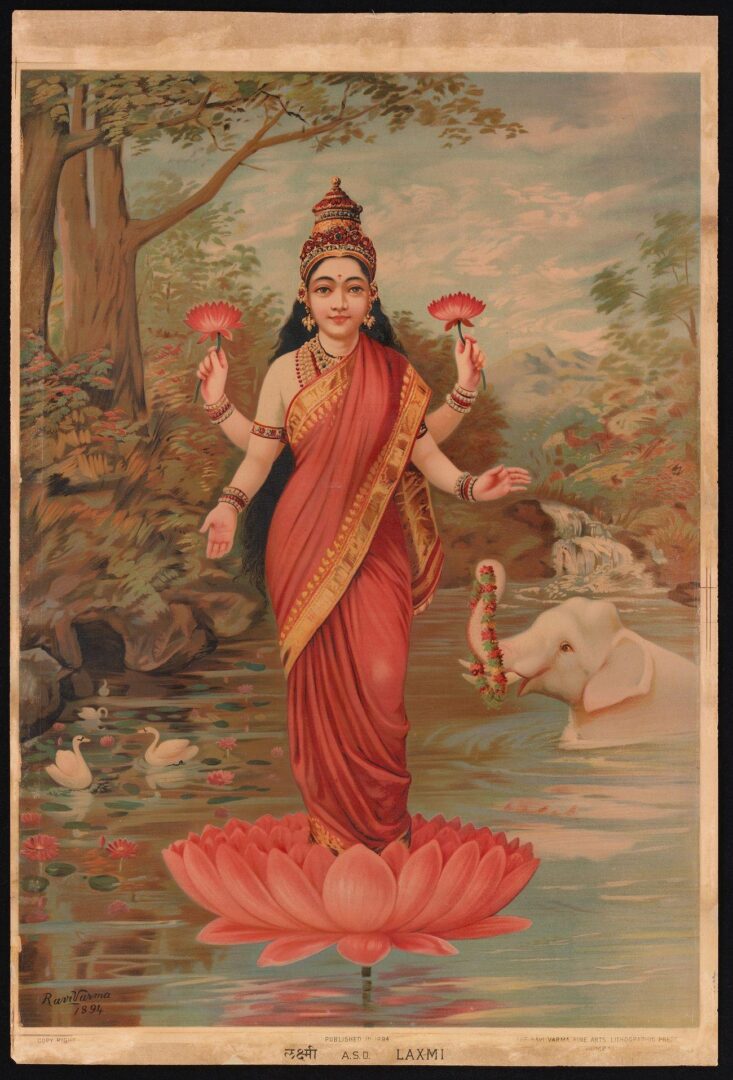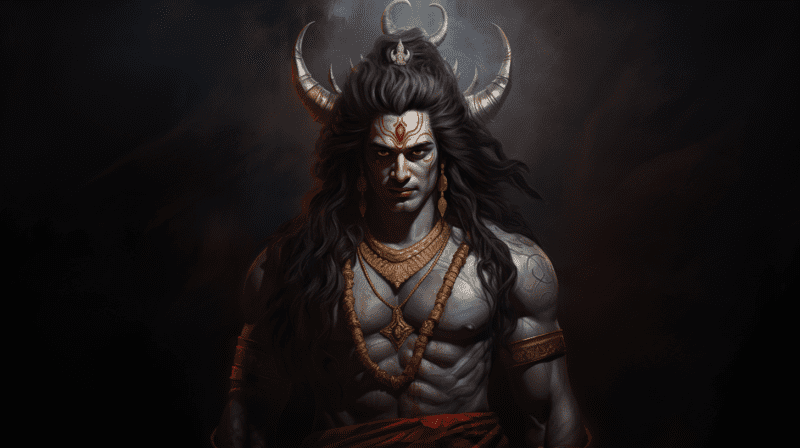Lakshmi, also known as Shri, is the Hindu goddess of wealth, prosperity, and good fortune. She appears as a stunning woman sitting or standing on a lotus flower, amidst wealth and abundance. The word ‘Lakshmi’ is derived from the Sanskrit word ‘lakshya’, which means ‘aim’ or ‘goal’. In Hinduism, she is considered to be the personification of the wealth and prosperity that one strives for in life.
Lakshmi is a beloved goddess and is worshipped during important festivals such as Diwali and Dhanteras. Her blessings are sought for financial stability, happiness, and success. But her significance goes beyond material wealth; she is also considered to be a symbol of inner wealth, such as knowledge, wisdom, and spiritual abundance.
Mythology:
Lakshmi is an ancient deity and has been worshipped in India for thousands of years. She is mentioned in the Vedas, the oldest Hindu scriptures, and is considered to be the consort of Lord Vishnu.
According to Hindu mythology, Lakshmi was born from the churning of the ocean by the gods and demons. It is said that when the ocean was churned, a number of things emerged, including Lakshmi, who was so beautiful that the gods and demons fought over her. To end the conflict, Lord Vishnu took her as his consort, and she has remained by his side ever since.
In Hindu mythology, Lakshmi is also associated with the goddess of fortune and prosperity, Mahalakshmi. The two are often depicted together and are worshipped as the guardians of wealth and prosperity.

Symbolism:
Lakshmi is a richly symbolic deity, and her various attributes and forms are steeped in meaning.
The lotus flower on which she is depicted is one of the most important symbols in Hinduism and is associated with spiritual growth and enlightenment. The lotus represents the idea that even though the world may be full of suffering, one can still rise above it and achieve inner peace.
Her depiction as a beautiful woman is also significant; beauty is seen as a symbol of good luck and prosperity in Hinduism, and Lakshmi’s beauty is said to bring blessings to those who worship her.
Lakshmi is also associated with wealth and abundance and is often depicted surrounded by gold coins, jewelry, and other riches. This symbolizes the idea that wealth and prosperity are the results of hard work and good deeds, and that these blessings can be attained through devotion and piety.
Importance of Lakshmi:
Millions of people all over the world worship Lakshmi, an important deity in Hinduism. She is considered to be the giver of wealth, prosperity, and good fortune, and her blessings are sought for financial stability, happiness, and success.
But her significance goes beyond material wealth. She is also considered to be a symbol of inner wealth, such as knowledge, wisdom, and spiritual abundance.
Lakshmi is also seen as a symbol of the goddess of fortune and is associated with the idea of good luck and prosperity. Individuals, families, and businesses all seek her blessings because it is believed that worshiping her will bring success and good fortune.
In Hinduism, Lakshmi is also associated with the idea of dharma, which means duty or moral law. She is considered to be the embodiment of dharma, and her blessings are seen as a sign of living in accordance with one’s duty and moral obligations.
How to worship:
There are many ways to worship Lakshmi, and her blessings can be sought through prayer, offerings, and rituals. One of the most popular ways to worship Lakshmi is through puja, a Hindu ceremony that involves offerings of flowers, incense, and food.
Lakshmi is also worshipped during important Hindu festivals, such as Diwali and Dhanteras. During these festivals, devotees light lamps, perform puja, and offer prayers to the goddess, seeking her blessings and protection.
Another popular way to worship Lakshmi is by reciting mantras and prayers dedicated to her. The most famous of these is the ‘Lakshmi Mantra’, which is said to bring good luck, wealth, and prosperity to those who recite it.
Conclusion:
Lakshmi, the Hindu goddess, is a revered deity in Hinduism, embodying beauty, grace, and compassion. She is considered to be the personification of wealth, prosperity, and good fortune and is worshipped by millions of people all over the world. Her mythology, symbolism, and significance are deeply ingrained in Hindu culture and religion, and her blessings are sought for financial stability, happiness, and success. The veneration of Lakshmi is a long-standing custom that continues today, whether through puja, offerings, or the recitation of mantras.
Key Takeaways:
Lakshmi is considered to be the Hindu goddess of wealth, prosperity, and good fortune. She is worshipped by millions of people all over the world, and her blessings are sought for financial stability, happiness, and success.
In Hinduism, Lakshmi is considered to be the consort of Lord Vishnu.
The name ‘Lakshmi’ is derived from the Sanskrit word ‘lakshya’, which means ‘aim’ or ‘goal’.
Lakshmi is worshipped in many different ways, including puja, offerings, and recitation of mantras and prayers. She is also worshipped during important Hindu festivals such as Diwali and Dhanteras.





